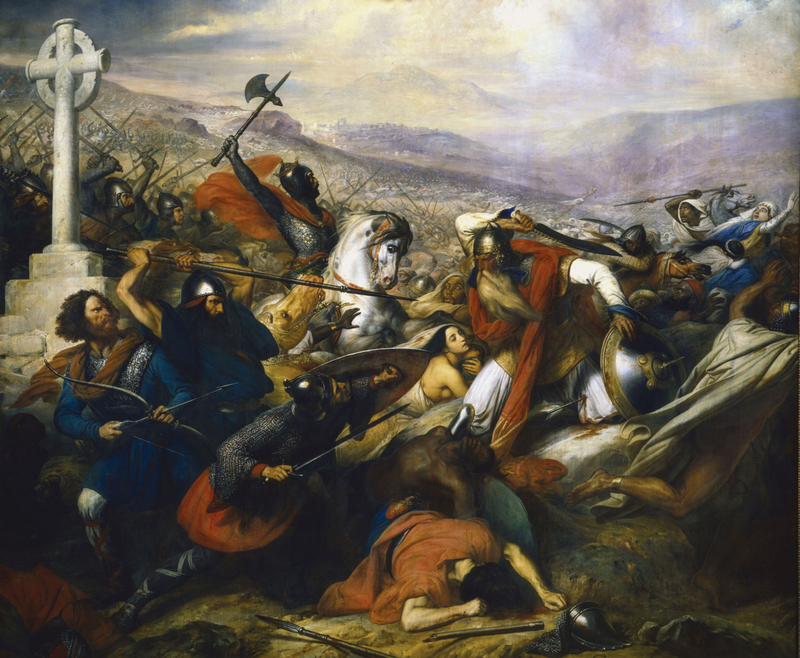
If Jesus had been conservative we might all be Muslim (i.e. and e.g., “no Battle of Poitiers“)…
* * * *
I have no idea why this “March 2021” post comes up as the main page for this blog when you Google “georgiawasp.” The notes give a fuller story, but there are newer posts. (The latest, A reminder: Great politicians STILL sell hope, at right.) Meanwhile, I’m working on the problem…
* * * *
What with the Coronavirus pandemic and the demands of working three days a week, it’s been tough to do posts on a consistent, timely basis. (See How Often Should You Blog in 2020?) But not for lack of topics or ideas. It’s because I blog mainly to learn, and for my own satisfaction. That means I “take enough time to do the job right,” not be consistent.
 And I last posted here back on April 17, almost two weeks ago. So on this last day of April, 2020, I’m juggling four or five possible blog posts. Like “Memories of Lori,” based on listening today to the Urban Cowboy soundtrack. (A movie that I saw back in 1980 with a lovely young copy editor at the St. Pete Times.)
And I last posted here back on April 17, almost two weeks ago. So on this last day of April, 2020, I’m juggling four or five possible blog posts. Like “Memories of Lori,” based on listening today to the Urban Cowboy soundtrack. (A movie that I saw back in 1980 with a lovely young copy editor at the St. Pete Times.)
Or a post on possible answers for really stupid Facebook posts. (Like my earlier Fighting right-wing distortions on Facebook.) So for this quick-response post I’ll go back to some thoughts I revisited five months ago, that have been percolating a good long while.
The topic is a favorite theme of mine – or Meme – that goes, “If so-and-so had been conservative, we’d all be ____!” And by the way, I take issue with today’s conservatives only because a reporter’s job – and by extension a blogger’s – is “challenge the prevailing quacks.”
And today’s conservatives are definitely the “prevailing quacks.”
For one example, “If the Founding Fathers had been conservative, we’d all be singing ‘God save the Queen’ at the start of our baseball games.” (If we weren’t playing cricket instead.) The idea – and the irony if not the incongruity – is that today’s conservatives act like they’re the only real Americans. The problem is that our forefathers came to this country mostly to get the hell away from conservatives – the ones who tended to stay back home.
In plain words, those old-time conservatives didn’t have the guts to put up with the challenges of creating a New World. It was the Independents and Dreamers who did all that.
Then there’s this, “If Jesus had been conservative, we’d all be talking Yiddish.” (“Oy vey,” to which might be added the Seinfeld meme, “Not that there’s anything wrong with that!”)
Or in the case of this post’s headline – “Thank God Jesus wasn’t a conservative” – the Punch line thereof would be: “Otherwise we Americans might all be Muslim.”
 But don’t take my word for it. Kenneth Clark said that in his 1969 book Civilisation: “Without Charles Martel‘s victory over the Moors at Poitiers in 732, western civilization might never have existed…” And by western civilization he meant western Christian civilization.
But don’t take my word for it. Kenneth Clark said that in his 1969 book Civilisation: “Without Charles Martel‘s victory over the Moors at Poitiers in 732, western civilization might never have existed…” And by western civilization he meant western Christian civilization.
Which again means that if Jesus had been conservative – as many ostensible Christians claim today – there would have been no viable force to stop the “Islamic advance into Western Europe.”
* * * *
There’s a bit of background in the notes about how I happened on to Clark’s observation…
But – to cut to the chase – here’s the connection between Charles Martel and Jesus not being conservative. The idea is that if Jesus had been conservative, He wouldn’t have started the New Religion – the “New Testament” – that eventually bore His name. And Judaism would likely have stayed a relatively small religious movement. (Without the proselytizing that is such a trademark of Christianity, it would have been confined to the fringes of the eastern Mediterranean.)
In plain words, there would be nothing to stop Islam from taking over Western Europe.
At page 17 in his first chapter, “The Skin of Our Teeth,” Clark noted how close Western civilization came to be snuffed out. That is, with Fall of the Roman Empire, life in what we call the Middle (or “Dark“) Ages was generally nasty, brutish and short.
For one example, during those 500 years or so it was rare person indeed who could read or write. (“[P]ractically no lay person, from kings and emperors downwards, could read or write.”) And as Clark noted, it was only in the Church that reading and writing were preserved. “We survived because … for centuries practically all men of intellect joined the Church.” And it was Church scribes who preserved not only reading and writing, but also the classics of antiquity. “In so far as we are heirs of Greece and Rome, we got through by the skin of our teeth.”
Which is one reason to thank God that Jesus wasn’t conservative.
Another reason is that if Jesus had been conservative – and Judaism stayed a small religion without Christian proselytizing – there would be no Charles Martel, the French warrior-king (and “Hammer“) who saved Christian Europe. As historian Edward Gibbon noted:
[H]ad Charles fallen, the [Muslim armies] would have easily conquered a divided Europe… [T]he Arabian fleet might have sailed without a naval combat into the mouth of the Thames. Perhaps the interpretation of the Koran would now be taught in the schools of Oxford, and her pulpits might demonstrate to a circumcised people the sanctity and truth of the revelation of Mahomet.
See Battle of Tours – Wikipedia. But that didn’t happen. Instead – and again cut to the chase – after many long centuries of struggle, mayhem and death, we now have a clearly-defined separation of church and state. Which started (arguably) with Charles Martel, an effective combination of ardent Christian, powerful military leader, and Independent.
Although Charles Martel ( d. 741) is one of the most noted heroes in Christianity when studying one of the many violent encounters between Christian and Muslim forces, Charles “The Hammer” Martel was no marionette of the Church. He was quite an independent and practical thinker as a military leader and as a politician.
To which we could add, “Martel was an Independent, just like Moses and Jesus!” (And like me, for that matter. See A reminder: “I’m an INDEPENDENT (Voter).”)
Which is another way of saying that after Martel’s victory at the Battle of Tours (or Poitiers) neither the Church nor the governments of Europe gained complete control. The result was a “dynamic tension” between the two forces, which turned out to be a blessing.
That is, Charles Martel “begat” Charlemagne – actually his grandson – who has been called “the father of Europe.” (He “united parts of Europe that had never been under Frankish or Roman rule.”) Which again wouldn’t have happened without Martel’s victory at Tours.
The point is that in the fullness of time, Charlemagne traveled to Rome, where the Pope crowned him “emperor.” (At a Mass on Christmas Day, 800, “when Charlemagne knelt at the altar to pray, the Pope crowned him Imperator Romanorum (‘Emperor of the Romans’) in Saint Peter’s Basilica.”) Charlemagne later thought that episode was a mistake, in that it gave the pope a pretext of “supremacy” over him. (And future secular rulers.) Which led Clark to note:
But historical judgments are very tricky. Maybe the tension between the spiritual and worldly powers throughout the Middle Ages was precisely what kept European civilisation alive. If either had achieved absolute power, society might have grown as static as the civilisations of Egypt and Byzantium.
(Clark, 20) And that – clearly – would have been the situation if Jesus had been either conservative or liberal. Instead, He and God seem to have worked together to maintain the Dynamic Tension that exists “even to this day,” between spiritual and worldly powers here in America. And why Jesus and God made sure that the foundations of American democracy included Freedom or religion and the separation of powers.
The result is that – whatever you might say about American democracy today – it is definitely not “static.” In short, if Jesus had been conservative, we here in America might have to see all our women togged out in those silly burqas, or otherwise covering themselves up…
* * * *

* * * *
Re: The “foul-up” resulting in this old (April 2020) post being made so prominent right now. Maybe it’s a sign from God? See for example Sign From God Meme – Image Results, including the one featuring various church billboards, including the one billboard saying, “Well, you did ask for a sign.”
Also on the not-up-to-date main page: Here’s the original note, when the April | 2020 | The Georgia Wasp started coming up as the main page. Here’s the note I wrote for that SNAFU:
I have no idea why this old post – from April 2020 – comes up as the main page when you Google “georgiawasp.” Something happened on the evening of April 3, 2021, and I’m not sure what. I was writing up the new post, Revisiting March 2020, that I finally published on Easter Sunday, April 4, 2021. For another more-recent post, click on An Updated ‘Geezer Guide to Supplements…’ Meanwhile, I’ll work on fixing the problem.
* * * *
The upper image is courtesy of Umayyad invasion of Gaul – Wikipedia, rephrased in the main text as “Islamic advance into Western Europe.” The main point: “The Umayyad invasion of Gaul occurred in two phases in 720 and 732. Although the Muslim Umayyads secured control of Septimania, their incursions beyond this into the Loire and Rhône valleys failed. By 759 they had lost Septimania to the Christian Franks.” The caption for the painting: “The Battle of Tours” – also called the Battle of Poitiers – “in 732, depicts a triumphant Charles Martel (mounted) facing Abdul Rahman Al Ghafiqi (right) at the Battle of Tours. Painting (1837) by Charles de Steuben.” See also the link Reconquista:
The Reconquista (Portuguese and Spanish for “reconquest”) was the period in the history of the Iberian Peninsula of about 780 years between the Umayyad conquest of Hispania in 711 and the fall of the Nasrid kingdom of Granada to the expanding Christian kingdoms in 1492.
The photo to the left of the paragraph beginning “But don’t take my word for it” is courtesy of Kenneth Clark Civilisation – Image Results. The quotations from Clark are from the hardcover book version of his Civilisation (TV series), pages 18 and 20. And for an interesting sidelight on “Sir” Clark, see A new book reveals Kenneth Clark was also a bed-hopping, wife-stealing rogue.
Though ostensibly a happily married man with a dutiful and caring wife … he couldn’t keep his manicured hands or his swooning heart away from other women. He was a serial adulterer, a constant seeker of affairs, even [the] wives of his close friends. This upright pillar of the Establishment was … as one of his detractors put it most succinctly, ‘a frightful s**t’.
As to “Christian civilization,” see How Sir Kenneth Clark Defended Christian Civilization on PBS.
And here’s some background on how I happened on Clark’s observations. I used to exercise seven hours a week. Over two of those hours included stair-stepping. (With a 28-pound weight vest and ten pounds of ankle weights.) And those two or more hours of stair-stepping were exceedingly boring. So to pass the time – and aside from listening to music on my iPod Shuffle – I watch VHS tapes, hooked up to a flat-screen TV. And my VHS collection includes a Box Set of Clark’s Civilisation (TV series). And some time ago – while stair-stepping an hour or so – I heard again Clark’s saying that Charles Martel saved western Christian civilization. (It was like a “sign from God…”) A side-note: I now exercise some eight hours a week, but have cut down on the “weighted” stair-stepping.
For more on the topic of Jesus-as-not-conservative, see The Story of the Law: Rene A. Wormser, 1962 paperback edition, by , at page 32. Briefly, Wormser used 29 pages to describe Moses’ role as “law-giver,” but only two to cover Jesus. Mostly, he wrote, because Jesus simply “preached what Jewish liberals had taught.” That is,”Jewish liberal thought had already produced the fine flowering of ethics which we now know best from Jesus’ lips.” For more on Wormser himself, see RENE A WORMSER, 85, LAWYER – (Obituary) The New York Times.
The lower image is courtesy of Coronavirus Mask – Image Results.

 For an example of a former player’s superstition:
For an example of a former player’s superstition:  The ancient Children of Israel had just
The ancient Children of Israel had just  Again, I wrote about this at length in last year’s
Again, I wrote about this at length in last year’s  Or not. Which is another way of saying that for all the grief we get – for our “idiosyncratic quirks” – we rabid sports fans do get some benefits. See for example,
Or not. Which is another way of saying that for all the grief we get – for our “idiosyncratic quirks” – we rabid sports fans do get some benefits. See for example, 

 That He was “special?” That He was – literally – the Son of God?
That He was “special?” That He was – literally – the Son of God? In modern terms – borrowing a page from
In modern terms – borrowing a page from  Whatever the merits of such a
Whatever the merits of such a 
 Or in the case of Moses, his “team” starts winning when he holds his arms up, but they start losing if he lets his arms down…
Or in the case of Moses, his “team” starts winning when he holds his arms up, but they start losing if he lets his arms down… On the other hand, you could just as easily say that such superstitions are a mass example of the
On the other hand, you could just as easily say that such superstitions are a mass example of the 
 And incidentally, Wikipedia defined
And incidentally, Wikipedia defined 

 Which brings us back to prophets like Isaiah (at left).
Which brings us back to prophets like Isaiah (at left).  Wikipedia added that “students who learn with understanding are able to transfer their knowledge to tasks requiring problem-solving with greater success…” So maybe that’s why the Apostle Paul (at right) took such care to distinguish the
Wikipedia added that “students who learn with understanding are able to transfer their knowledge to tasks requiring problem-solving with greater success…” So maybe that’s why the Apostle Paul (at right) took such care to distinguish the 
 I tried to read through
I tried to read through 